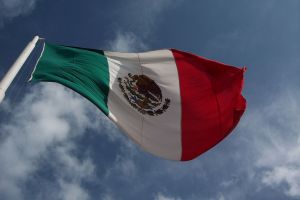This Chicago Council on Global Affairs survey finds that a majority in Mexico now express a favorable view of the United States.
Introduction
A recent Buendía y Laredo survey finds that a majority in Mexico now express a favorable view of the United States and only a minority say that US-Mexico relations are worsening.
Key Findings
Many analysts expected that Andrés Manuel López Obrador’s landside electoral victory in Mexico would precipitate a mano a mano showdown with US President Donald Trump. Yet both presidents have made conciliatory gestures toward each other, and Mexican public opinion toward the United States has completely shifted course from 2017. A recent Buendía y Laredo survey finds that a majority in Mexico now express a favorable view of the United States and only a minority say that US-Mexico relations are worsening.
In the United States, President Trump is still pushing for an expanded border wall between the United States and Mexico, but a recent Chicago Council survey finds that Americans are more positive toward Mexico now than they have been since 2002. These developments may signal a window for rebuilding bilateral relations, especially if both governments ratify the new US-Mexico-Canada Agreement.
- A majority in Mexico (56%) have a favorable view of the United States, reversing the all-time low (30%) recorded in 2017.
- American views of Mexico continue to warm, reaching an average of 58 on a scale from 0 to 100, up notably from 2013’s average of 43.
- Despite warming views, few Mexicans (13%) say US-Mexico relations are improving; instead, a majority (60%) say relations are staying about the same.
- Surveyed before the new trade agreement was reached, Americans (63%) and Mexicans (78%) both think NAFTA is good for their countries’ economy. The Council’s January 2019 survey found that seven in ten Americans (70%) think the new US-Mexico-Canada Agreement will be good for the US economy.
US Methodology
This report’s analysis of country thermometer readings and support for the USMCA are based on data from interviews conducted January 11 -13, 2019 by Ipsos Public Affairs using their large-scale, nationwide online probability panel, the KnowledgePanel OmniWeb. A total of 1,019 interviews were completed among a weighted national sample of adults 18 years of age or older, living in all 50 states and the District of Columbia. The margin of error on weighted data is ±3 percentage points for the full sample. Additional results come from the 2018 Chicago Council Survey of the American public on foreign policy, a project of the Lester Crown Center on US Foreign Policy. The 2018 Chicago Council Survey was conducted by GfK Custom Research using their large-scale, nationwide online research panel July 12-31, 2018 among a weighted national sample of 2,046 adults, 18 years of age or older, living in all 50 US states and the District of Columbia. The margin of sampling error for the full sample is ±2.37, including a design effect of 1.1954. For both surveys, partisan identification is based on respondents’ answer to a standard partisan self-identification question: “Generally speaking, do you think of yourself as a Republican, a Democrat, an Independent, or what?”
The 2018 Chicago Council Survey was made possible by the generous support of the Crown family, the John D. and Catherine T. MacArthur Foundation, the US-Japan Foundation, the Korea Foundation, and the Robert R. McCormick Foundation.
Mexico Methodology
Results reported from Mexico are based on data collected by Buendía & Laredo. The nationwide face-to-face survey was conducted from August 17 to August 23, 2018, among a weighted national sample of Mexican adults, 18 years of age or older, who reside in housing units within the national territory. Assuming a design effect (deff) of 1.3, the sampling margin of error of the survey is ±3.53 percentage points.




